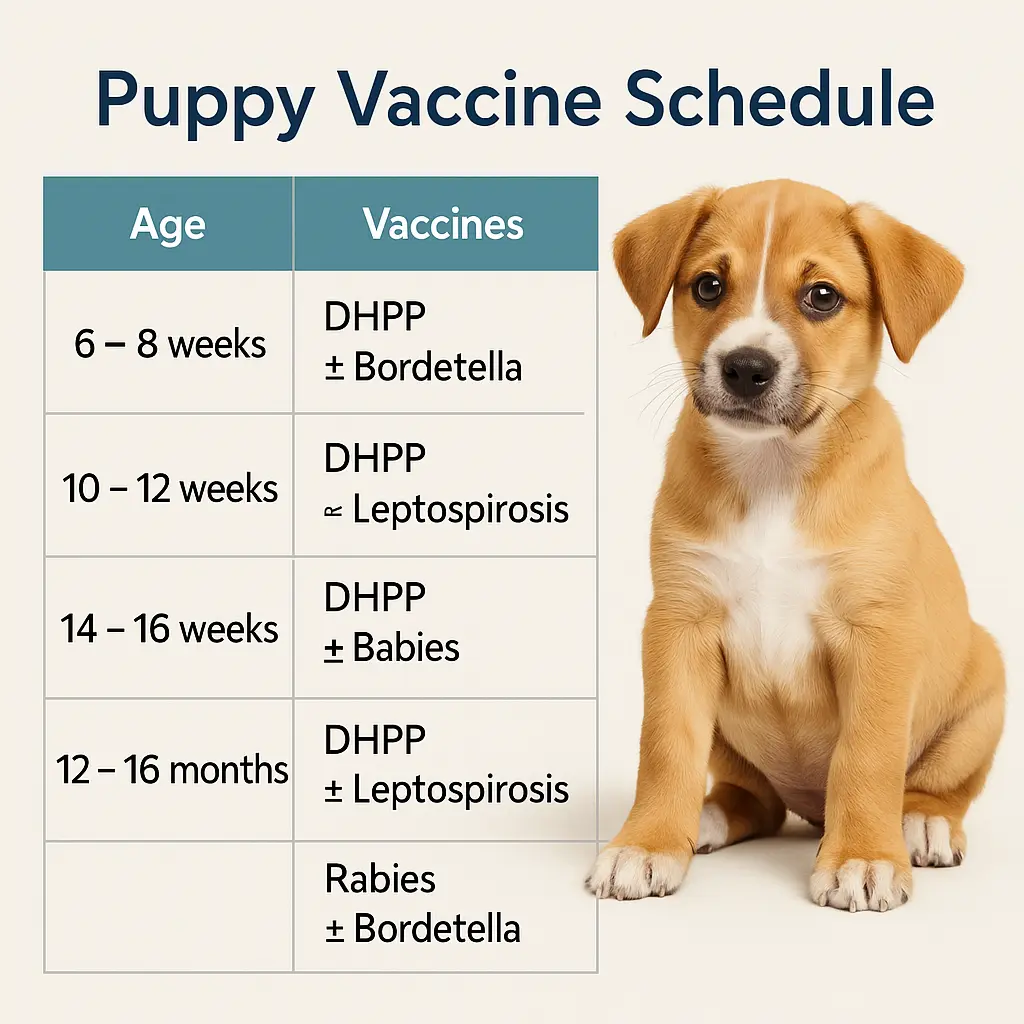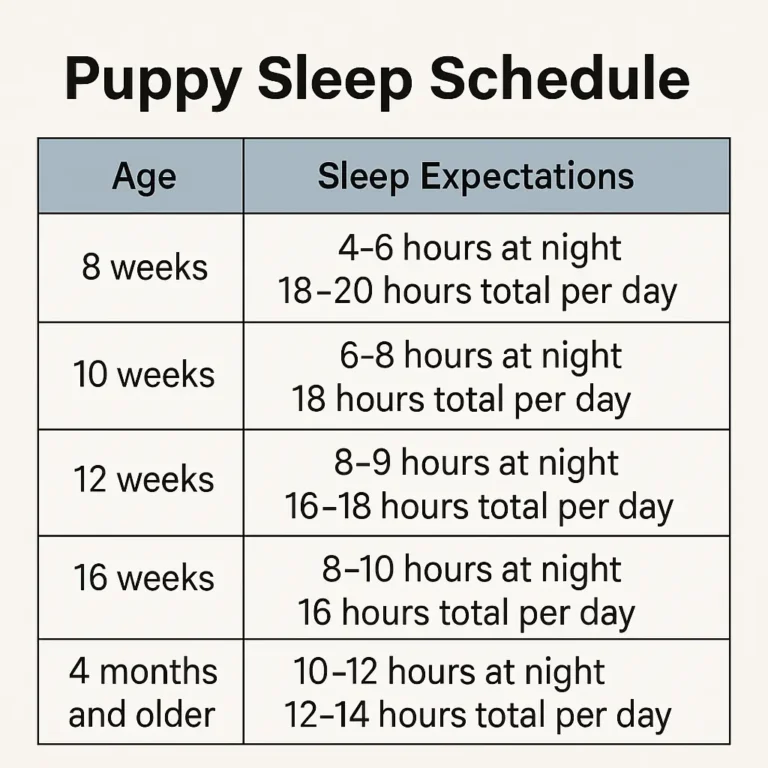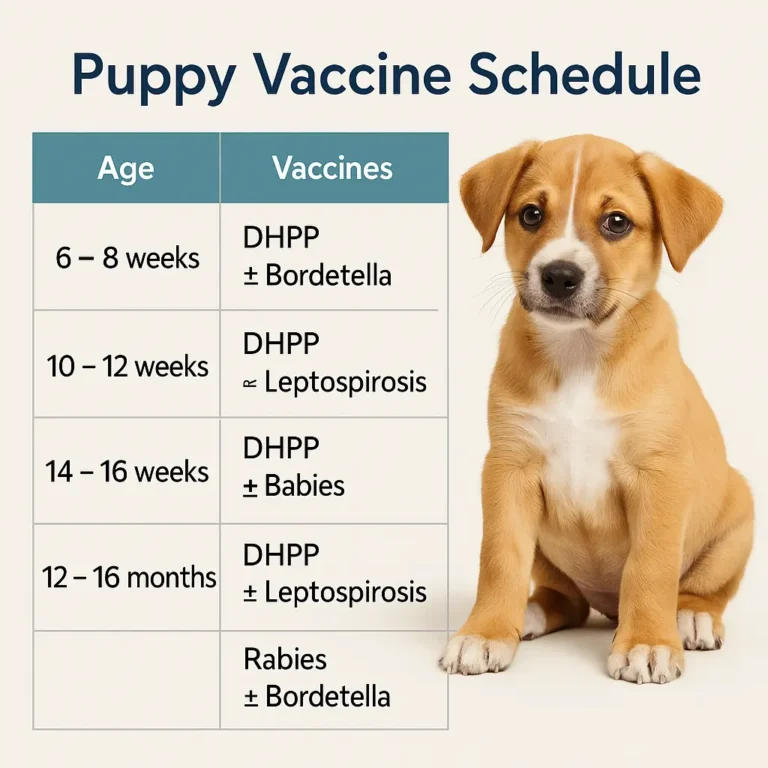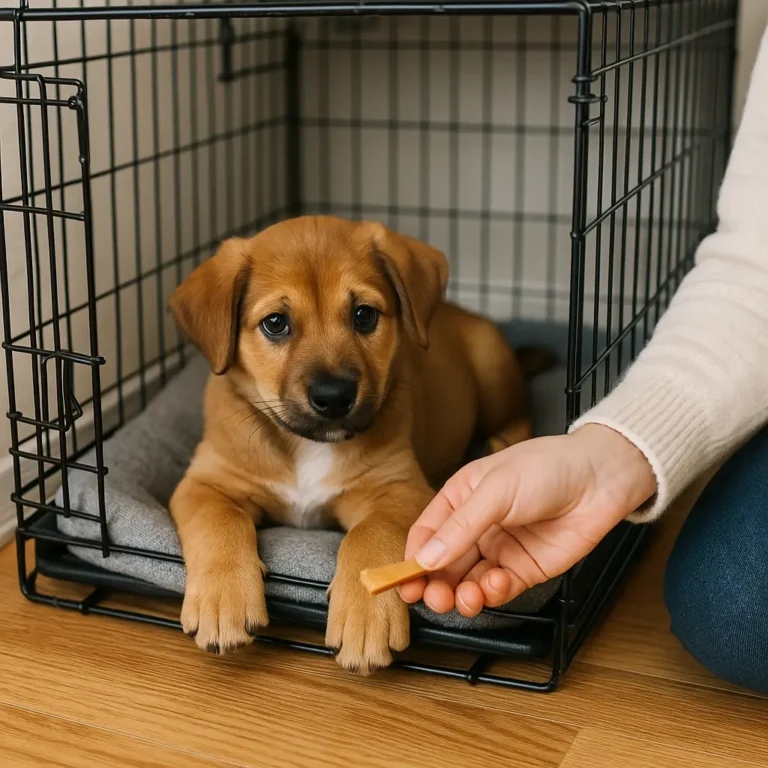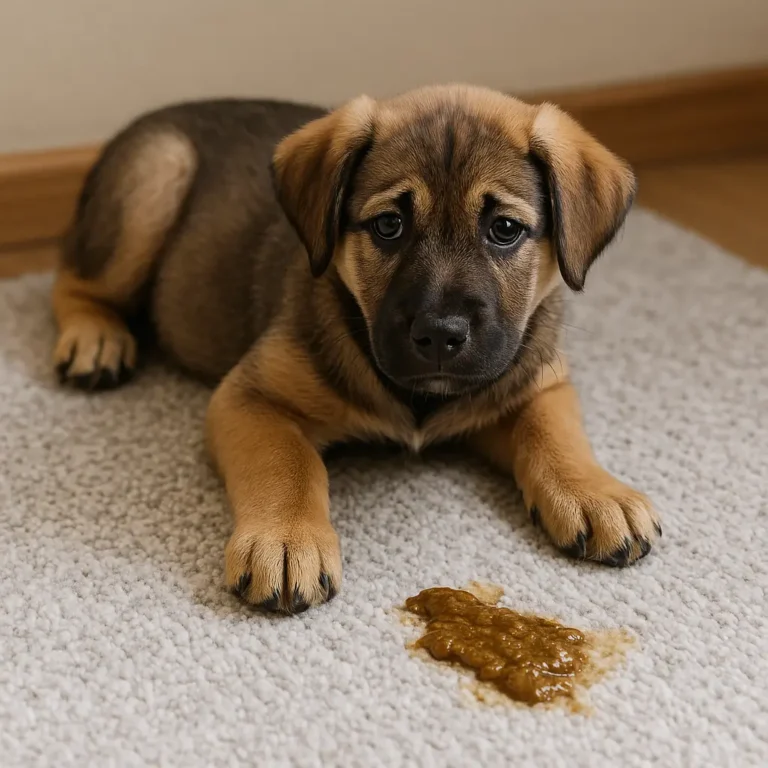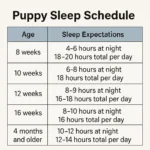Getting a new puppy is exciting—but also a big responsibility. One of the most important things you’ll do as a new dog parent is follow a puppy vaccine schedule. Vaccinations protect your pup from deadly diseases and help them live a longer, healthier life. From understanding what vaccines do puppies need to building a practical puppy shot schedule, this guide walks you through everything step by step. We’ve also included the dog vaccine schedule, deworming timelines, and more. Ready to give your puppy the best start? Keep reading—your pup’s future health depends on it.
📅 Full Puppy Vaccination Schedule You Should Follow From Day One
A proper puppy vaccination schedule starts early—usually at 6–8 weeks of age—and continues into their first year. Missing even one dose can leave your pup vulnerable, so staying on track is critical.
Here’s a general puppy shots schedule most vets recommend:
-
6–8 weeks: Distemper, Parvovirus (DHPP), ± Bordetella
-
10–12 weeks: DHPP booster, ± Leptospirosis
-
14–16 weeks: DHPP final, Rabies, ± Lyme, ± Canine Influenza
-
12–16 months: DHPP booster, Rabies booster
-
Every 1–3 years: Booster shots, depending on the vaccine
The vaccination schedule for puppies ensures immunity builds up gradually and protects them at every stage of development.
Remember, some vaccines are legally required (like Rabies), while others are highly recommended based on your lifestyle or location.
Keep a copy of your puppy's vaccine records and schedule the next shots before you leave the vet’s office. Ask your vet to customize your dog vaccine schedule if you travel often, board your dog, or visit dog parks frequently.
With a clear puppy vaccine schedule, you're not just ticking boxes—you’re actively preventing deadly diseases before they ever have a chance to strike.
💉 What Are the Core Vaccines Puppies Must Have?
Core vaccines are the foundation of every puppy vaccination schedule—they protect against the most dangerous and contagious diseases that affect all dogs, regardless of breed or lifestyle.
Here are the core vaccines every puppy should receive:
-
Distemper: A deadly virus affecting the nervous, gastrointestinal, and respiratory systems.
-
Parvovirus: Causes severe vomiting, diarrhea, and dehydration; highly contagious.
-
Adenovirus (Canine Hepatitis): Damages liver, kidneys, and eyes.
-
Parainfluenza: One of the viruses that causes kennel cough.
-
Rabies: Fatal and required by law in many regions.
These vaccines are typically bundled into the DHPP combination shot. Administered every 3–4 weeks from 6 to 16 weeks of age, DHPP builds strong, layered immunity.
Rabies is usually given at 14–16 weeks, with a booster one year later and then every 1–3 years.
Following a structured puppy shot schedule ensures your dog develops lifelong protection during the critical growth period.
Ask your vet to align your dog vaccine schedule with both state regulations and the unique needs of your dog. Staying on top of these puppy vaccinations could save your dog’s life.
🐕 Dog Breeds That Require a Tighter Vaccine Schedule
While all dogs benefit from timely vaccines, certain breeds are more vulnerable and may need stricter monitoring.
Breeds that often require a closely managed puppy vaccine schedule include:
Rottweilers and Dobermans: Higher risk for Parvovirus.
Bulldogs and Pugs: Brachycephalic breeds prone to respiratory issues.
Toy breeds (like Yorkies and Chihuahuas): May need split-dose vaccinations due to size.
Labrador Retrievers: Often involved in outdoor activities, raising exposure risks.
These breeds may need extra boosters or alternate timing. Always consult your vet for a customized puppy vaccination schedule based on breed and lifestyle.
🧪 Optional Puppy Vaccines: Are They Really Necessary?
Besides core shots, your puppy shot schedule might include optional (non-core) vaccines. These are tailored based on environment, travel habits, and lifestyle.
Let’s break down the most common optional vaccines:
-
Leptospirosis: Spread through contaminated water or wildlife urine. Ideal for adventurous pups or rural settings.
-
Lyme Disease: Transmitted by ticks—consider this if you live in a tick-prone area.
-
Canine Influenza (Dog Flu): Recommended for dogs that attend daycares, dog parks, or boarding facilities.
-
Bordetella: Prevents kennel cough, essential for social or traveling dogs.
These aren’t required for all dogs, but they may be essential in certain scenarios. For example, puppies in urban areas with high dog-to-dog interaction may benefit from more comprehensive protection.
Consult your vet to evaluate which optional vaccines to include in your puppy vaccination schedule. Even if they're labeled "non-core," these shots could be critical depending on your puppy’s risk profile.
Keep in mind: prevention is always cheaper and safer than treatment. While the dog vaccine schedule may seem overwhelming, the peace of mind it brings is priceless.
🔬 What Are the Non-Core Vaccines for Dogs? Know Before You Skip
Non-core vaccines are optional but recommended based on a dog’s specific lifestyle, location, or exposure risks. They may not be essential for every pup, but they provide added layers of protection.
Common non-core vaccines include:
-
Leptospirosis: Prevents kidney and liver damage from bacteria in contaminated water or soil.
-
Lyme Disease: Protects against tick-borne illness, especially in wooded or grassy areas.
-
Canine Influenza: Dog flu spreads fast in kennels, dog shows, or daycare.
-
Bordetella bronchiseptica: Primary cause of kennel cough. Highly contagious in social environments.
-
Coronavirus (Canine, not COVID-19): Mild but included in some multi-valent shots.
Unlike core vaccines, non-core ones are not mandatory but often recommended. For instance, if you live in the city and frequent dog parks, Bordetella and influenza shots are smart additions to your puppy shot schedule.
Puppies with travel plans or exposure to wildlife should be considered for Lyme and Leptospirosis vaccines. Always talk to your vet to build a tailored puppy vaccine schedule that protects against realistic threats.
Skipping a non-core vaccine can be safe—but only if your vet says so. Smart planning beats future regret.
🪱 Is There a Recommended Deworming Schedule for Puppies?
Yes! Deworming is a key part of a complete puppy vaccination schedule. Worms can cause serious health issues like malnutrition, anemia, and even organ damage if not treated early.
Here’s a general deworming timeline:
-
2–3 weeks old: First deworming
-
Every 2 weeks until 12 weeks of age
-
Monthly from 3 to 6 months
-
Every 3 months for life (depending on risk factors)
Common parasites include roundworms, hookworms, whipworms, and tapeworms. Puppies can even contract worms from their mother’s milk or during birth.
Deworming is usually done with oral medication and often overlaps with the puppy vaccine schedule. Some broad-spectrum parasite preventatives also cover fleas, ticks, and heartworm.
Don’t skip stool testing. Even with deworming, puppies should have their poop tested regularly to confirm they’re parasite-free.
Consult your vet to align your puppy shot schedule with deworming for max effectiveness. This ensures your puppy not only avoids diseases but also grows strong from the inside out.
Bottom line: deworming isn’t optional—it’s an essential part of keeping your puppy healthy and protected.
FAQ
When should my puppy get their first vaccine?
How often do puppies get shots?
Are puppy vaccines safe?
Do indoor dogs need all vaccines?
What if I miss a puppy shot?
Can I vaccinate my puppy myself?
Is Bordetella required for all puppies?
Do vaccines guarantee 100% protection?
Protect Your Pup with the Right Vaccine Plan
Following a puppy vaccine schedule is one of the smartest moves you can make as a pet parent. From understanding what vaccines do puppies need to customizing a dog vaccine schedule, this guide helps you make informed, proactive decisions. With the right timing, consistent vet visits, and attention to deworming, your puppy is set up for a lifetime of health and happiness. Don’t wait until problems arise—use this guide to stay ahead. Because a healthy pup today means a thriving dog tomorrow. Save this page and start your puppy shots schedule now. Your pup is counting on you. Curious to know what dog am I? Unleash your inner pup with our quiz!

